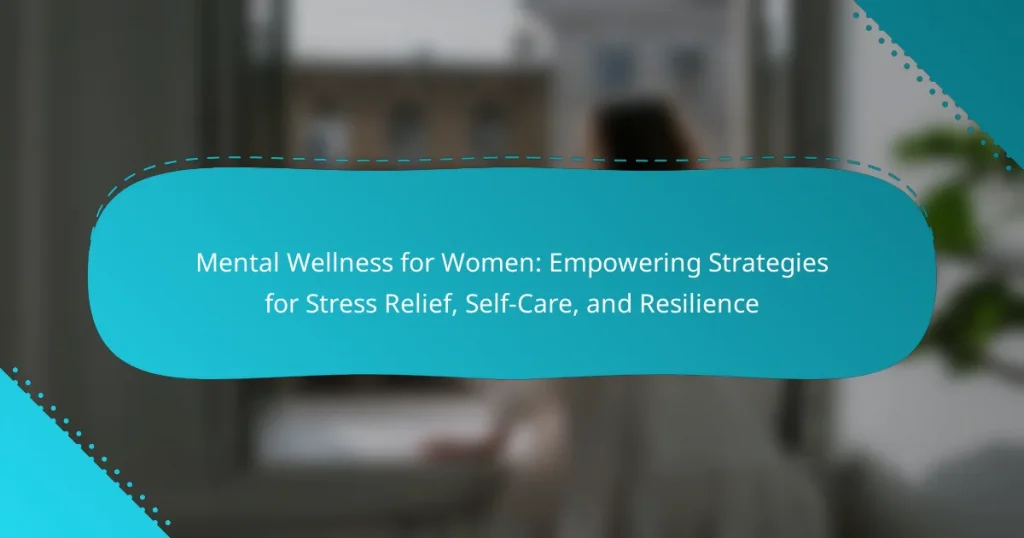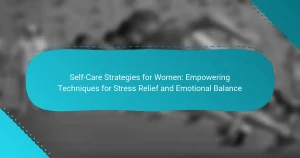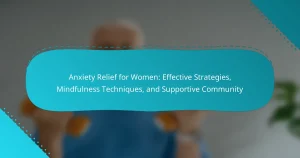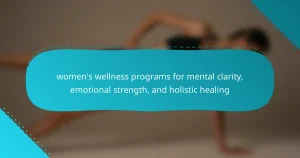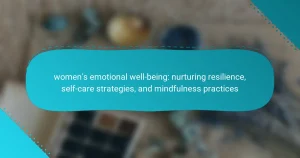Mental wellness is crucial for women facing daily stressors. This article explores self-care practices, effective stress management techniques, and strategies for building emotional resilience. It highlights the importance of social support networks and unique empowerment methods like mindfulness and creative expression. Prioritizing mental wellness enhances emotional stability and fosters a more balanced life.
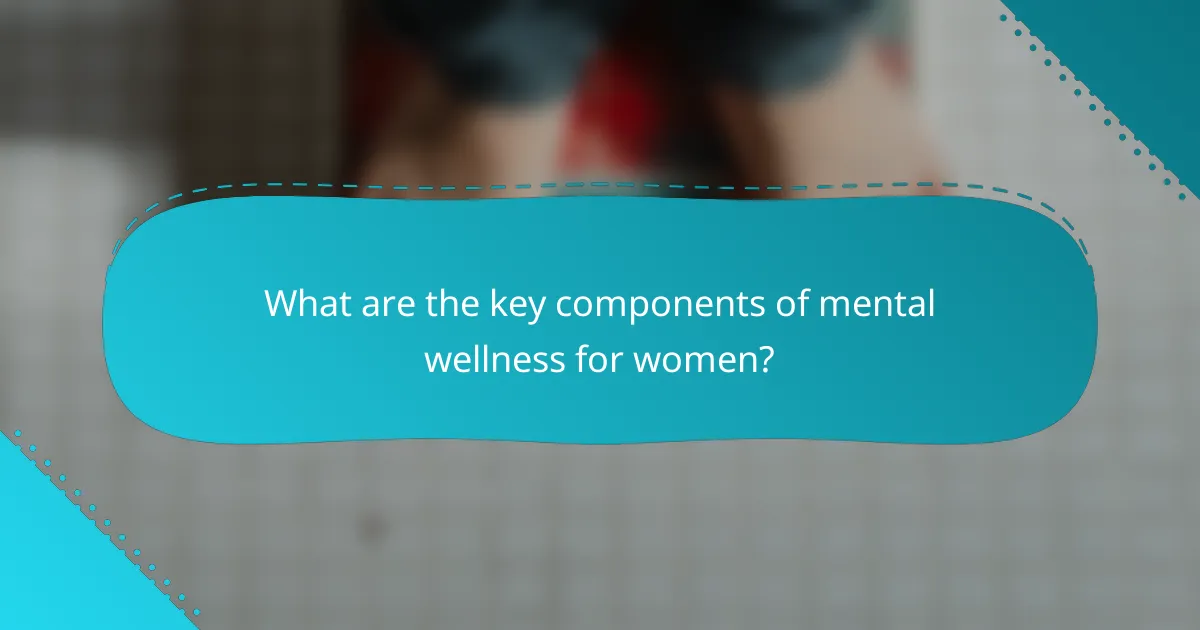
What are the key components of mental wellness for women?
Key components of mental wellness for women include self-care, stress management, emotional resilience, and social support. These elements empower women to navigate challenges effectively.
Self-care practices, such as regular exercise and mindfulness, enhance overall well-being. Stress management techniques, including deep breathing and time management, reduce anxiety. Emotional resilience involves developing coping strategies to handle life’s ups and downs. Strong social support networks provide encouragement and foster a sense of belonging.
Incorporating these components into daily routines can significantly improve mental wellness for women, leading to a more balanced and fulfilling life.
How does stress impact women’s mental health?
Stress significantly affects women’s mental health, leading to anxiety, depression, and emotional exhaustion. Chronic stress can disrupt hormonal balance, impacting mood and cognitive function. Women may experience symptoms such as irritability, fatigue, and difficulty concentrating. Empowering strategies like mindfulness, social support, and regular exercise can enhance resilience and promote mental wellness. Research indicates that women are more likely to internalize stress, making effective coping mechanisms crucial for their mental health.
What role does self-care play in enhancing mental wellness?
Self-care significantly enhances mental wellness by promoting stress relief and resilience. Engaging in self-care practices, such as mindfulness and physical activity, leads to improved mood and reduced anxiety. Research indicates that women who prioritize self-care experience better emotional regulation and overall mental health. Regular self-care routines can foster a sense of control and empowerment, essential for navigating life’s challenges.
What strategies can women use for effective stress relief?
Women can use various strategies for effective stress relief, including mindfulness, physical activity, and social support. Mindfulness practices, such as meditation and deep breathing, help enhance emotional regulation. Regular physical activity, like yoga or walking, reduces stress hormones and boosts mood. Building a strong support network fosters resilience and provides emotional outlets. Prioritizing self-care routines, including adequate sleep and healthy nutrition, further strengthens mental wellness. Engaging in hobbies and creative activities can also serve as effective stress relievers.
What are practical techniques for daily stress management?
Practical techniques for daily stress management include mindfulness, physical activity, and structured self-care routines. Mindfulness practices, such as meditation, help center thoughts and reduce anxiety. Regular physical activity releases endorphins, enhancing mood and resilience. Establishing a self-care routine, including adequate sleep and balanced nutrition, supports overall mental wellness. Journaling can also provide clarity and release emotional tension.
How can physical activity contribute to stress relief?
Physical activity significantly contributes to stress relief by promoting the release of endorphins, which enhance mood. Regular exercise reduces anxiety and improves overall mental wellness. Studies show that women engaging in physical activity experience lower stress levels and increased resilience. Activities like yoga and walking not only provide physical benefits but also foster mindfulness, further alleviating stress.
What unique challenges do women face in maintaining mental wellness?
Women face unique challenges in maintaining mental wellness due to societal pressures, hormonal fluctuations, and caregiving responsibilities. These factors can lead to higher stress levels and increased risk of anxiety and depression. Research shows women are more likely to experience mental health disorders than men, highlighting the need for tailored strategies. Empowering approaches include establishing strong support networks, practicing self-care, and engaging in mindfulness techniques. Addressing these challenges is crucial for fostering resilience and promoting overall mental well-being in women.
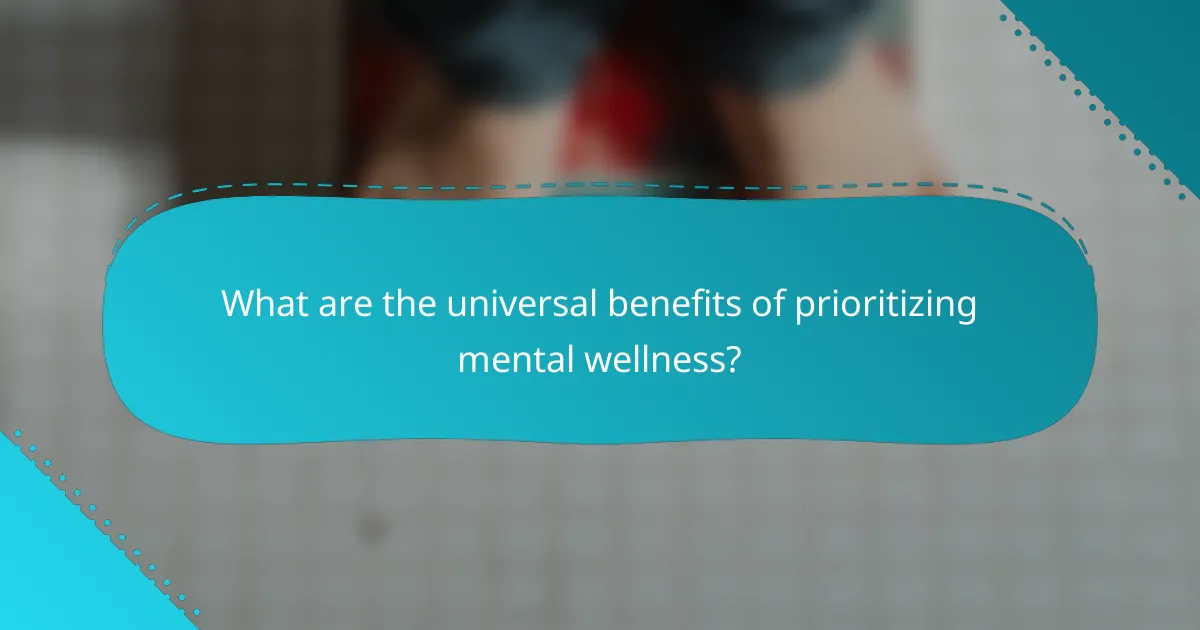
What are the universal benefits of prioritizing mental wellness?
Prioritizing mental wellness leads to enhanced emotional stability, improved relationships, and increased productivity. These benefits empower women to manage stress effectively and build resilience. Research indicates that women who engage in self-care practices report lower anxiety levels and greater life satisfaction. Additionally, prioritizing mental wellness fosters a supportive community, which is essential for shared experiences and collective growth.
How does mental wellness improve overall quality of life?
Mental wellness significantly enhances overall quality of life by fostering emotional balance and resilience. Improved mental health leads to better stress management, stronger relationships, and increased productivity. Women practicing self-care strategies report higher life satisfaction and reduced anxiety levels. As a result, mental wellness becomes a cornerstone for achieving personal and professional goals, ultimately enriching daily experiences.
What are the long-term effects of neglecting mental health?
Neglecting mental health can lead to chronic stress, anxiety, and depression over time. These conditions may result in physical health issues, decreased productivity, and strained relationships. Long-term neglect can also diminish resilience and coping skills, making it harder to manage future stressors. Prioritizing mental wellness through self-care and stress relief strategies is essential for overall well-being.
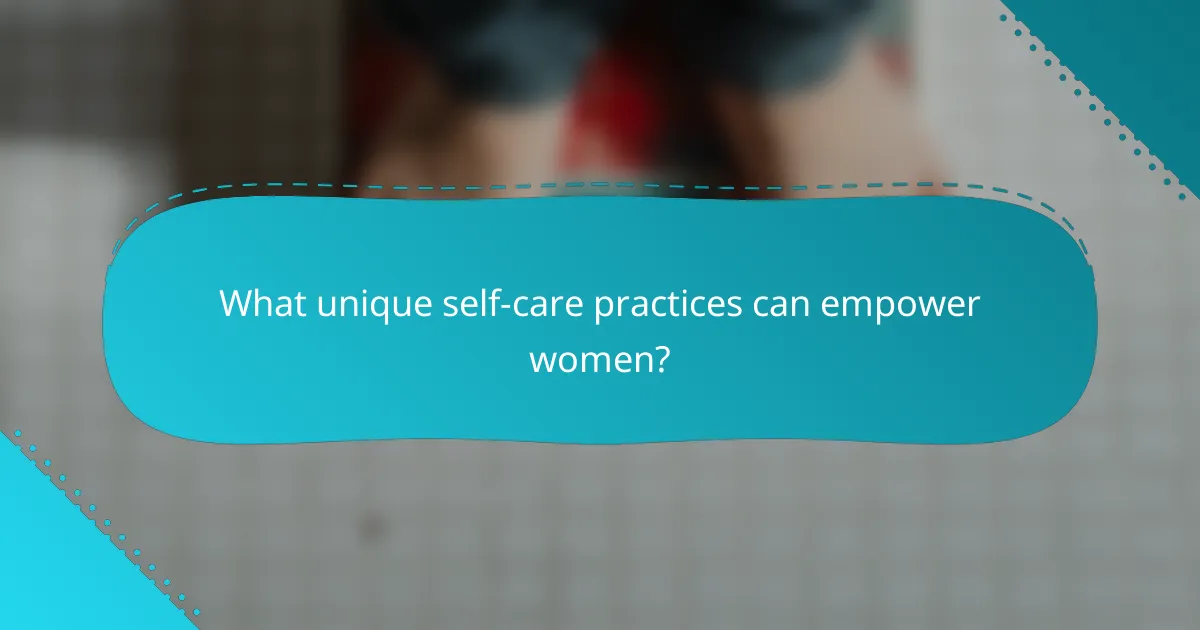
What unique self-care practices can empower women?
Unique self-care practices that empower women include mindfulness meditation, creative expression through art, nature immersion, and community building. These practices enhance mental wellness by reducing stress and fostering resilience. Mindfulness meditation promotes present-moment awareness, while creative expression allows for emotional release. Nature immersion connects women with their surroundings, boosting mood. Community building creates supportive networks, enhancing emotional strength. Each practice serves as a unique strategy for personal empowerment and mental well-being.
How can mindfulness practices be tailored for women’s needs?
Mindfulness practices can be tailored for women’s needs by focusing on their unique stressors and experiences. Techniques such as guided imagery, body scans, and journaling can enhance emotional awareness and resilience. Integrating community support through group sessions fosters connection and shared experiences. Research shows that women benefit from practices that emphasize self-compassion and body positivity, addressing societal pressures. These tailored approaches create a safe space for women to explore and nurture their mental wellness.
What role do social connections play in women’s mental wellness?
Social connections significantly enhance women’s mental wellness by providing emotional support and reducing feelings of isolation. Strong relationships contribute to resilience and stress relief, promoting overall mental health. Studies show that women with robust social networks experience lower anxiety and depression levels. Engaging in social activities fosters a sense of belonging, which is crucial for emotional stability.
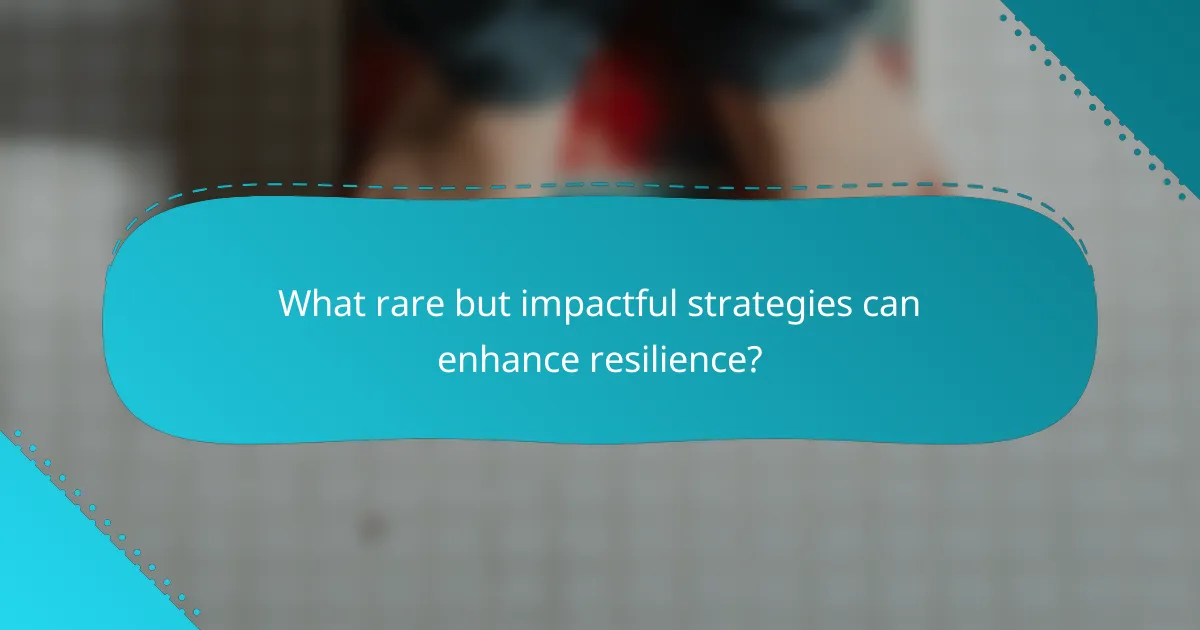
What rare but impactful strategies can enhance resilience?
Practicing mindfulness and engaging in creative expression are rare but impactful strategies that can enhance resilience. Mindfulness helps women focus on the present, reducing anxiety and improving emotional regulation. Creative expression, such as art or writing, fosters self-discovery and provides an outlet for stress relief. These strategies cultivate a deeper sense of self-awareness and emotional strength, essential for navigating life’s challenges.
How can creative expression foster mental wellness?
Creative expression significantly enhances mental wellness by providing an outlet for emotions and fostering resilience. Engaging in activities like painting, writing, or music can reduce stress and improve mood. Research shows that creative endeavors stimulate brain regions associated with emotional regulation. Furthermore, these activities promote self-discovery and personal growth, leading to improved self-esteem. Women, in particular, benefit from creative expression as it encourages community connection and support, essential for mental health.
What unconventional approaches to self-care are effective?
Unconventional approaches to self-care can significantly enhance mental wellness for women. Practices like forest bathing, which involves immersing oneself in nature, can reduce stress levels and improve mood. Another effective strategy is expressive writing, allowing individuals to process emotions and gain clarity. Art therapy, using creative expression, fosters resilience and self-discovery. Mindful movement practices, such as tai chi or dance, integrate physical activity with mental focus, promoting overall well-being. Lastly, community building through shared experiences can create supportive networks, enhancing emotional health.
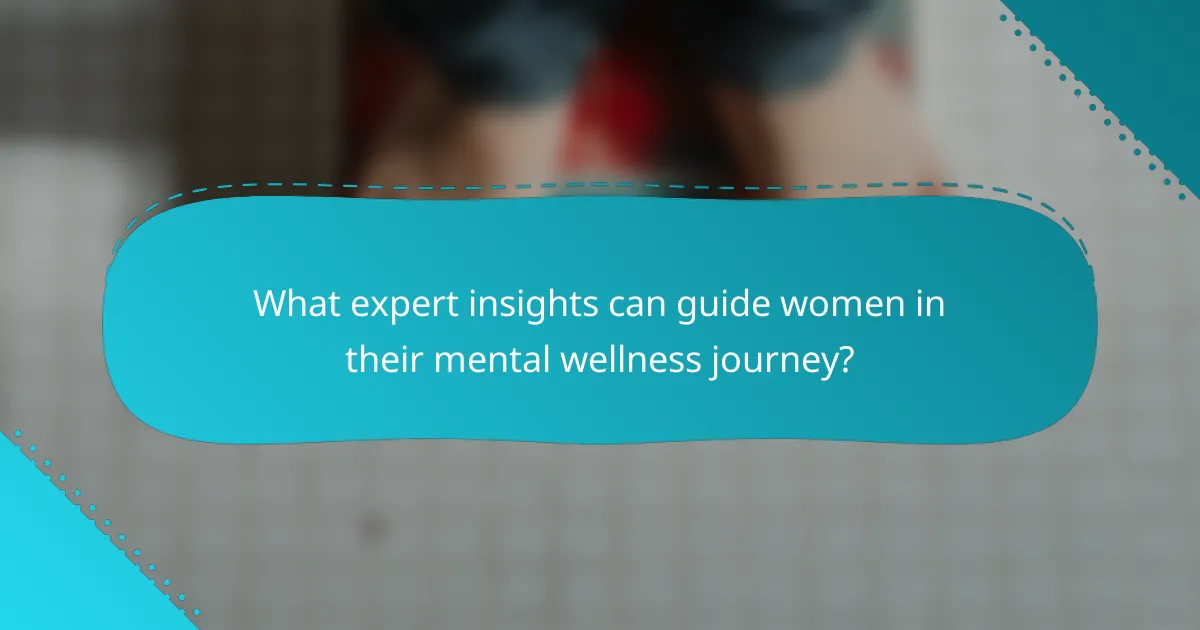
What expert insights can guide women in their mental wellness journey?
Expert insights for women in their mental wellness journey emphasize the importance of self-care, stress relief, and resilience-building strategies. Techniques such as mindfulness meditation, regular physical activity, and establishing a supportive social network significantly enhance mental well-being. Research shows that women who practice self-compassion report lower levels of anxiety and depression. Additionally, prioritizing sleep and nutrition plays a crucial role in maintaining mental health. Seeking professional help when needed is essential for navigating challenges effectively.
What are common mistakes to avoid in self-care practices?
Common mistakes in self-care practices include neglecting personal needs, overcommitting to obligations, and ignoring emotional health. Many women prioritize others, sacrificing their well-being. This can lead to burnout and decreased resilience. Additionally, self-care routines may become rigid, lacking flexibility to adapt to changing needs. Ensuring self-care is personalized and balanced is essential for effective stress relief and mental wellness.
How can women create a personalized mental wellness plan?
Women can create a personalized mental wellness plan by identifying their unique needs and preferences. Start by assessing stress triggers and emotional patterns. Incorporate self-care practices such as mindfulness, exercise, and social connections. Set realistic goals and track progress to enhance resilience. Regularly review and adjust the plan to ensure it remains effective and supportive.
What are the best practices for maintaining mental wellness over time?
To maintain mental wellness over time, prioritize self-care practices, stress management techniques, and resilience-building activities. Incorporate regular physical activity, mindfulness exercises, and social connections.
Engaging in hobbies and creative outlets can enhance emotional well-being. Additionally, setting boundaries and seeking professional support when needed are crucial for long-term mental health.
Establishing a daily routine that includes time for relaxation and reflection fosters stability and reduces anxiety. Regularly reassess personal goals and adjust self-care strategies to align with evolving needs.
